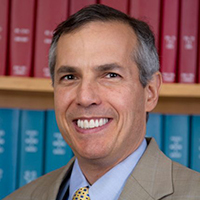
Lawrence B. Marks, MD
Dr. Sidney K. Simon Distinguished Professor of Oncology Research, Chair, Radiation Oncology, UNC-Chapel HillLawrence B. Marks, MD, is the Dr. Sidney K. Simon Distinguished Professor of Oncology Research and chair of the Department of Radiation Oncology at UNC-Chapel Hill. His interests include the treatment of breast and lung cancer and the understanding and prevention of radiation tissue injury.
Dr. Marks completed medical school at the University of Rochester School of Medicine and Dentistry, followed by residency in radiation oncology at Massachusetts General Hospital. He is the recipient of grants from the National Institutes of Health (NIH) and the Lance Armstrong Foundation and has been an invited lecturer at national and international institutions.

Carmen Bergom, MD, PhD
Associate Professor of Radiation Oncology, Washington University School of Medicine in St. LouisCarmen Bergom, MD, PhD, is an Associate Professor in radiation oncology. Dr. Bergom treats breast cancer patients, and she also has a translational research laboratory focusing on using innovative genetic models to improve the therapeutic ratio radiation therapy by identifying targets to enhance tumor radiosensitivity and minimize normal tissue toxicities, with a special focus on minimizing cardiac toxicity. Dr. Bergom obtained undergraduate degrees in Chemical Engineering and Biology from the Massachusetts Institute of Technology (MIT), a Master’s degree in Epidemiology at Cambridge University, and M.D. and Ph.D. degrees from the Medical College of Wisconsin (MCW). She completed her medical residency in Radiation Oncology at MCW. During her residency, she was named a Leonard B. Holman Research Pathway Fellow by the American Board of Radiology. Throughout her training and career, Dr. Bergom has been interested in coupling basic research findings with translational and clinical research. Dr. Bergom joined the faculty at Washington University in 2020.
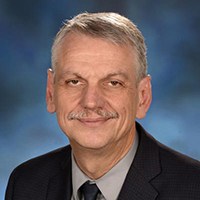
Søren Bentzen, PhD, DMSc, FASTRO
Professor of Epidemiology and Public Health & Professor of Radiation Oncology, Director of the Division of Biostatistics & Bioinformatics, Dept. of Epidemiology and Public Health; Director of the Biostatistics Shared Service, UM Greenebaum Comprehensive Cancer Center; Director of the Biostatistics Core, UMB Institute for Clinical & Translational Research; Director of Translational Research, UM Proton Therapy Alliance; University of Maryland School of MedicineSøren M. Bentzen, MSc, PhD, DMSc, Professor, Director of the Division of Biostatistics and Bioinformatics, Department of Epidemiology and Public Health, University of Maryland School of Medicine since 2013. Dr. Bentzen also serves as Director of the Biostatistics Shared Service, University of Maryland Marlene and Stewart Greenebaum Comprehensive Cancer Center, and as Director of the Biostatistics Core of the University of Maryland Baltimore Institute of Clinical and Translational Research (ICTR). He is also an Adjunct Professor of Radiobiology and Medical Physics, University of Copenhagen, Denmark. His previous appointments include MD Anderson Cancer Center (1987-1988), Danish Cancer Society/Aarhus University (1988-1997), Gray Laboratory/Mount Vernon Hospital, London (1998-2004), and University of Wisconsin School of Medicine and Public Health (2005-2013) where he was a professor of Human Oncology and held affiliate faculty positions in the departments of Biostatistics & Medical Informatics and in Medical Physics.
Dr. Bentzen received a MSc in physics and mathematics (1981), a PhD in medical image analysis (1986), and a DMSc (doctor of medical science) in quantitative clinical radiobiology (1994), all from Aarhus University, Denmark. He has published >500 original papers and book chapters, and has presented >370 invited lectures. He currently serves on 10 international cancer journal editorial boards. His research has been recognized by 30 awards and honors, including the ASTRO Gold Medal (2017), ESTRO Breuer Gold Medal (2003), the MD Anderson Distinguished Alumnus Award (2008), and Honorary Life Memberships of the Association of Radiation Oncologists of India (2008), the Belgian Society for Therapeutic Radiology and Oncology (2009), and the German Society for Radiation Oncology (2020). He was inducted as a Fellow of the American Society of Radiation Oncology (FASTRO) in 2018. He held an Honorary Professorship at University College London (2000-2005) and was a Visiting Statistician to the Medical Research Council Clinical Trials Office, London, UK (1998-2004).
Dr. Bentzen is currently the principal investigator of a randomized controlled phase III trial of resource sparing radiation therapy for locally-advanced squamous cell carcinoma of the head and neck, sponsored by the International Atomic Energy Agency; member of the Head and Neck Cancer Steering Committee of the National Cancer Institute (NCI); founding member of the Steering Committee of the International Radiogenomics Consortium; member of the UICC Global Task Force on Radiotherapy for Cancer Control; member of the Board of Directors of the International Commission on Radiation Units. Dr. Bentzen was one of the leaders of the QUANTEC (Quantitative Analyses of Normal Tissue Effects in the Clinic) initiative (2007-2010) and serves as a member of the PENTEC (Pediatric Normal Tissue Effects in the Clinic) steering committee (2016-present). He was a member of the ASTRO Task Forces to develop evidence-based guidelines on the appropriate fractionation for whole breast irradiation (2009-2010) and for localized prostate cancer (2016-2018). He has served as chair or member of 17 (seven currently active) Independent Data and Safety Monitoring Committees or Trial Steering Committees. Served as co-chair for Translational Research for two RTOG phase III trials.
His main research interests include bioeffect modeling; biomathematics; applied biostatistics; clinical trial design; evidence-based medicine; late effects of radiotherapy; clinical radiobiology; integration of data from genomics, proteomics, and molecular imaging into novel therapeutic strategies.
In addition to his role as Director of the Biostatistics Shared Service, Dr. Bentzen is a member of the Experimental Therapeutics Program within the University of Maryland Marlene and Stewart Greenebaum Comprehensive Cancer Center Program in Oncology. He collaborates with both basic and clinical researchers, aiming for the rapid translation of discoveries from the laboratory to the clinic. Dr. Bentzen’s research focuses on three broad fields: normal-tissue radiation biology; biomarkers, including genomic and imaging biomarkers, in predictive oncology; and the pre-clinical and clinical development of drug-radiation combinations.
Frank Biddle
Patient Advocate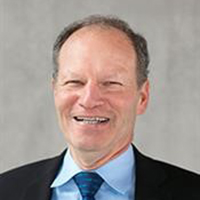
David Brenner, MD
Vice Chancellor for Health SciencesSchool of Medicine, UC San Diego
Dr. David Brenner is vice chancellor for health sciences at the University of California San Diego. In this role, he leads the School of Medicine, Skaggs School of Pharmacy and Pharmaceutical Sciences, Herbert Wertheim School of Public Health and Human Longevity Science, and UC San Diego Health.
A distinguished physician-scientist and leader in the field of gastroenterological research, Dr. Brenner first joined UC San Diego Health in 1985 as a gastroenterology fellow, later joining the School of Medicine faculty, and serving as a physician at Veterans Affairs (VA) San Diego Healthcare System. He also served as a Pew Scholar in the Biomedical Sciences and a Clinical Investigator in the VA system. In 1993, Dr. Brenner became professor and chief of the Division of Digestive Diseases and Nutrition at the University of North Carolina at Chapel Hill, where he continued to earn accolades for his patient care and research.
He was ultimately recruited to UC San Diego Health from Columbia University Medical Center College of Physicians and Surgeons, where from 2003 to 2007 he was Samuel Bard Professor and chair of the Department of Medicine, a member of the Herbert Irving Comprehensive Cancer Center, a member of the Columbia University Institute of Nutrition, and physician-in-chief of New York Presbyterian Hospital/Columbia.
Dr. Brenner’s professional memberships include the American Society for Clinical Investigation; the Association of American Physicians, for which he is currently President-Elect; the American College of Physicians; the American Gastroenterological Association, and the American Clinical and Climatological Association. He is also on the board of directors of two philanthropic foundations, the AlphaOne Foundation and the Alcoholic Beverage Medical Research Foundation. Dr. Brenner has also been published numerous times and serves on several editorial boards.
He earned his medical degree from the Yale University School of Medicine. After completing his residency at Yale-New Haven Medical Center, he served as a research associate in the Genetics and Biochemistry Branch of the National Institute of Diabetes and Digestive and Kidney Diseases (NIDDK) of the National Institutes of Health (NIH).
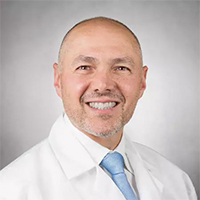
Ezra Cohen, MD, FRCPSC, FASCO
Chief, Division of Hematology/Oncology, Department of Medicine, UC San DiegoCo-Director, San Diego Center for Precision Immunotherapy
Associate Director for Clinical Sciences, UC San Diego Moores Cancer Center
Co-Leader, Solid Tumor Therapeutics Program
Co-Director, Hanna and Mark Gleiberman Head and Neck Cancer Center
Ezra Cohen, MD, is Chief of the Division of Hematology‐Oncology, and co-Director of the San Diego Center for Precision Immunotherapy and an internationally renowned translational researcher. A physician-scientist, Dr. Cohen led an independently funded laboratory interested in mechanisms of action of novel therapeutics. He has made major contributions to targeted therapy. His recent National Institutes of Health-funded work in the study of epidermal growth factor receptor inhibitors in head and neck cancer has contributed to the understanding of the biology of this critical signaling network, integration of these agents into standard of care, and definition of mechanisms to overcome resistance. He recently served as chair of the NCI Head and Neck Cancer Steering Committee that oversees NCI-funded clinical research (including all NCI Cooperative Group trials) in this disease.
Dr. Cohen is Associate Director for Translational Science and leader of the Solid Tumor Therapeutics research program at Moores Cancer Center. He brings his expertise and preeminent reputation in head and neck cancer research and patient care to solid tumor therapeutics. Among other roles, he is chair of the Protocol Review and Monitoring Committee (PRMC) and serves as a member of the Cancer Council, and the Cancer Center’s Executive Committee.
Dr. Cohen recently served as editor-in-chief of Oral Oncology, the highest impact specialty journal in head and neck cancer, and has recently chaired two Multidisciplinary Head and Neck Cancer Symposia—the largest international meeting of its kind—sponsored by the American Society for Radiation Oncology, the American Society of Clinical Oncology and the American Head and Neck Society. He has been the principal investigator on multiple studies of novel agents in head and neck cancer and other solid tumors in all phases of development including chemoprevention, phase I, II, and III trials. Dr. Cohen has authored more than 170 papers and has presented his research at national and international meetings. In addition, he has served as a grant reviewer for the NIH, American Association for Cancer Research, American Society of Clinical Oncology, and the Ontario Institute for Cancer Research.
Dr. Cohen completed residencies in Family Medicine at the University of Toronto and in Internal Medicine at Albert Einstein College of Medicine. He completed a Hematology/Oncology fellowship at the University of Chicago where he was named chief fellow. Prior to his arrival in San Diego, Dr. Cohen was Co-Director of the Head and Neck Cancer Program, Associate Director for Education and Program Director for the Hematology/Oncology Fellowship at the University of Chicago Comprehensive Cancer Center. A dedicated educator, Dr. Cohen also mentored and developed young faculty in his program.
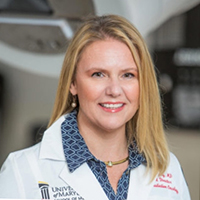
Heather Curry, MD
Applied Clinical Programs Director, Medical Affairs, Varian, a Siemens Healthineers companyHeather A. Curry, MD, is the Director of Applied Clinical Programs at Varian, A Siemens Healthineers Company. She is board certified in both Radiation Oncology and Hospice and Palliative Medicine. She received her undergraduate degree in Philosophy from Bryn Mawr College and her MD from the Temple University School of Medicine. Following completion of her Radiation Oncology residency at Washington University in St. Louis, Dr. Curry practiced for over 17 years in both academic and community settings. She has extensive industry experience across a broad range of domains including healthcare information technology, clinical decision support tool development, evidence-based medicine, health economics outcomes research, value-based care, medical policy development, regulatory compliance, and clinical trials. Prior to joining Varian in 2020, she was Director of Radiation Oncology for NantHealth and a Clinical Specialist for IBM. Dr. Curry has served on committees at the national, state, and local levels including the Payer Relations Committee for the American Society for Therapeutic Radiology and Oncology (ASTRO), the Medical Advisory Committee for the Lung Cancer Screening Program of the Maryland Cigarette Restitution Fund Cancer Prevention, Education, Screening and Treatment Program (CRF CPEST), and the Cecil County Cancer Task Force.
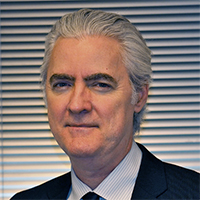
Joseph Deasy, PhD, FAAPM
Chair, Department of Medical Physics, Enid A. Haupt Endowed Chair in Medical Physics, Memorial Sloan Kettering Cancer CenterSince 2010, Dr. Joseph O. Deasy has been the Enid A. Haupt Chair in Medical Physics and the Chair of the Department of Medical Physics at Memorial Sloan Kettering Cancer Center. The MSK Department of Medical Physics, one of the oldest and largest medical physics groups in the world, conducts research and provides clinical support for radiological and molecular imaging, radiotherapy, all aspects of radiation safety, and biomedical engineering. Dr. Deasy also leads the Predictive Informatics Service within the Department of Medical Physics that focuses on using advanced mathematical, statistical, and artificial intelligence methods to support cancer research and treatment. His group’s research focuses on the use of information to classify and predict response to cancer treatments, with a focus on the optimization of radiation therapy planning and delivery. He has been the Principal Investigator of six NIH research projects and also leads the Mathematical Oncology Initiative funded by the Breast Cancer Research Foundation. Under his leadership, MSK has implemented advanced optimization and AI methods that have been used to treat over 5000 patients. Dr. Deasy is the author or co-author of over 250 peer-reviewed publications. Prior to coming to MSK, Dr. Deasy was a full Professor with tenure and the Director of the Division of Bioinformatics and Outcomes Research, in the Department of Radiation Oncology at Washington University in Saint Louis. He received his PhD in Physics and Astronomy from the University of Kentucky in 1992. He was a National Cancer Institute-supported Postdoctoral Fellow in Medical Physics at the University of Wisconsin-Madison. He is also a Fellow of the American Association of Medical Physicists.

Issam El Naqa, PhD, DABR, FAAPM
Professor of Radiation Oncology, Moffitt Cancer CenterIssam El Naqa received his B.Sc. (1992) and M.Sc. (1995) in Electrical and Communication Engineering from the University of Jordan, Jordan, and was awarded a first place young investigator award for his M.Sc. work. He worked as a software engineer at the Computer Engineering Bureau (CEB), Jordan, 1995-1996. He was awarded a DAAD scholarship to Germany, where he was a visiting scholar at the RWTH Aachen, 1996-1998. He completed his Ph.D. (2002) in Electrical and Computer Engineering from Illinois Institute of Technology, Chicago, IL, USA, receiving highest academic distinction award for his PhD work. He completed an M.A. (2007) in Biology Science from Washington University in St. Louis, St. Louis, MO, USA, with highest distinction, where he was also pursuing a post-doctoral fellowship in medical physics and was subsequently hired as an Instructor (2005-2007) and then an Assistant Professor (2007-2010) at the departments of radiation oncology and the division of biomedical and biological sciences and was an adjunct faculty at the department of Electrical engineering. He became an Associate Professor at McGill University Health Centre/Medical Physics Unit (2010-2015) and associate member of at the departments of Physics, Biomedical Engineering, and Experimental medicine, where he was a designated FRSQ and CIHR scholar. He later joined the Department of Radiation oncology at the University of Michigan at Ann Arbor, where he was a Professor and associate member in Applied Physics and the Michigan institute of data science. He recently become the founding chair of the department of Machine Learning at Moffitt Cancer Center, Tampa, Fl. He is a certified Medical Physicist by the American Board of Radiology. He is a recognized authority in the fields of machine learning, data analytics, and oncology outcomes modeling and has published extensively in these areas with more than 200+ peer-reviewed journal publications and 4 edited textbooks. He has been a member and fellow of several academic and professional societies including AAPM and IEEE. His research has been funded by several federal and private grants in Canada and the USA and served on national and international study sections. He acts as a peer-reviewer and editorial board member for several leading international journals in his areas of expertise.
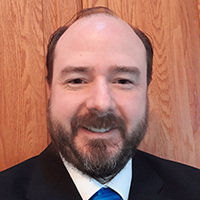
Jimm Grimm, PhD, DABR
Lead CyberKnife Physicist, Geisinger Health System, Adjunct Professor, Dept. Medical Imaging and Radiation Sciences, Thomas Jefferson UniversityDr. Jimm Grimm, PhD is co-chair of the AAPM Working Group on Biological Effects of Hypofractionated Radiotherapy/SBRT (WGSBRT). The main WGSBRT product is the May 2021 Special Issue of Red Journal on HyTEC: High Dose per Fraction, Hypofractionated Treatment Effects in the Clinic. The simple goal of HyTEC was to create Normal Tissue Complication Probability (NTCP) and Tumor Control Probability (TCP) models from Stereotactic Body Radiation Therapy (SBRT) / Stereotactic Ablative Body Radiotherapy (SABR) published data rigorously like QUANTEC, but limited reporting standards made this challenging. Therefore the summary clinical tables were simplified with current best NTCP/TCP estimates, and the conclusion of each HyTEC paper is a section on reporting standards to enable future projects to quantify radiation benefit/risk tradeoffs more accurately. Dr. Grimm is the Lead CyberKnife Physicist at Geisinger with a clinical focus, having commissioned several treatment machines and providing the physics service for thousands of SBRT patients.

Austin Hopper, MD
Resident Physician, Radiation Medicine & Applied Sciences, UC San Diego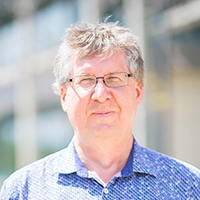
Vitali Moiseenko, PhD
Professor, Radiation Medicine & Applied Sciences, UC San DiegoDr. Vitali Moiseenko is a Professor and serves as Technology Service Chief for both the Genitourinary (GU) and Head/Neck Cancer Disease Teams. He also oversees a laboratory in the Center for Quality, Innovation, Value and Efficiency in Radiotherapy (QUIVER).
A research-focused Medical Physicist, his interests include outcomes data analysis, functional imaging, Monte Carlo simulations, propagation of uncertainties associated with radiation therapy and modeling of tumor and normal tissue response to radiation. He is the author of over 130 peer-reviewed journal articles, reviews and book chapters. He is also a dedicated educator and is involved with Medical Physics Residency Program. He has been named Teacher of the Year by our medical physics residents multiple times, recognizing his valuable contributions to their education and training.
Dr. Moiseenko serves on multiple national committees in the American Association of Physicists in Medicine (AAPM), including Task Group 256, Task Group 166, the Biologic Effects Sub-Committee, the Working Group on Biologic Effects of Hypofractionation and SBRT. He has also participated in multiple QUANTEC, HyTEC and PENTEC Committees and Reports.
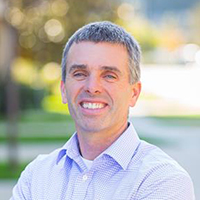
Kevin Moore, PhD
Professor & Deputy Division Director of Medical Physics, Assistant Vice Chair for Physics and Technology Research, Radiation Medicine & Applied Sciences, UC San DiegoDr. Moore is the Deputy Director of the Medical Physics Division and the RMAS Assistant Vice-Chair for Physics & Technology Research. He is also the Director of the Center for Quality, Innovation, Value and Efficiency in Radiotherapy (QUIVER). Knowledge-based planning involves applying prior knowledge from large datasets of previously treated patients in order to optimize treatment planning of new patients, significantly improving plan quality and efficiency. He is currently engaged in both the development of new knowledge-based dose prediction methods as well as the clinical implementation of knowledge-based radiotherapy treatment planning across the UC San Diego enterprise.
Dr. Moore has successfully applied this approach to a wide variety of radiotherapy treatment sites, including head-and-neck, prostate, gynecologic, brain, lung, pancreas, bone, anorectal, and liver cancers. He has published 40 peer-reviewed papers and book chapters, and is lead inventor on two patents regarding knowledge-based dosimetric prediction. His other research interests are focused on the expansion of data-driven methods in radiotherapy, particularly creating efficient decision support systems and the use of application programming interfaces (APIs) to automate error-prone and inefficient clinical processes. He is overseeing the technical implementation of the Ethos Accelerator and the work flow processes for adaptive radiotherapy.
Dr. Moore is a lecturer and mentor in the UCSD physics and physician residencies. He is also an active clinical medical physicist focused on external beam radiotherapy.

Arno J. Mundt, MD, FASTRO, FACRO
Chair, Radiation Medicine & Applied Sciences, UC San DiegoDr. Arno J. Mundt is a Professor and Founding Chair of the Department of Radiation Medicine and Applied Sciences (RMAS) and also a member of the Executive Governing Committee of the Moores NCI-Designated Comprehensive Cancer Center.
An internationally-recognized academic radiation oncologist whose career has focused on the development and implementation of novel radiation technologies in a wide number of malignancies, he is an author of over 200 journal articles and book chapters, predominantly focused on advanced radiation technologies, Dr. Mundt has edited 3 academic textbooks, two devoted to intensity-modulated radiotherapy (IMRT) and image-guided radiotherapy (IGRT) with over 100 contributors from the United States, Canada, Europe and Asia. He has delivered over 250 invited lectures at cancer symposia and conferences throughout the United States, Europe, South America and Asia, and has been a Visiting Professor at over 30 Universities and Cancer Centers.
Dr. Mundt has been recognized with numerous awards and accolades over his career, including being named a Fellow of the American College of Radiation Oncology (ACRO) and the American Society for Radiation Oncology (ASTRO) as well as a Top Doctor by the Chicago and San Diego Magazines multiple times. He has been an invited speaker at over 200 seminars, symposia and workshops in the United States and abroad. He has received a Career Achievement Award from the Radiating Hope Organization and currently serves on the Radiating Hope Board of Trustees. A former ACRO President and Board Chair, he received the ACRO Gold Medal in 2017. He has been on multiple Editorial Boards including serving as Senior Editor (Gynecology) of the International Journal of Radiation Oncology, Biology and Physics as well as Section Editor for Up-To-Date; he is also on the Board of Directors of multiple charity organizations including Radiating Hope, Cure Cervical Cancer Foundation, and the Canines-N-Kids Foundation.

Harald Paganetti, PhD
Director of Physics Research, Department of Radiation Oncology, Massachusetts General HospitalProfessor of Radiation Oncology, Harvard Medical School
Harald Paganetti is a Professor of Radiation Oncology at Harvard Medical School and Director of Physics Research for the Department of Radiation Oncology at Massachusetts General Hospital. He received his PhD in experimental nuclear physics in 1992 from the Rheinische-Friedrich-Wilhelms University in Bonn, Germany. He has been working in radiation therapy research since 1994 and has made many significant contributions to the field of radiation oncology physics and biology, specifically in proton therapy. He has published about 300 peer-reviewed publications and numerous book chapters and edited 3 books on proton radiation therapy. His research interests include planning and delivery uncertainties in radiation therapy, biological effect modeling, Monte Carlo dose calculation, advanced optimization and imaging techniques as well as understanding radiation induced toxicities and systemic effects on the immune system. His work has been funded mostly by the National Institute of Health, including 7 R01 grant awards as Principal Investigator throughout his career. For his efforts in mentoring junior faculty he received the A. Clifford Barger Excellence in Mentoring Award by Harvard Medical School.
In addition to his research, he has been involved in numerous task groups and committees for organizations such as PTCOG, IAEA, ICRU, ICRP, IOMP, AAPM and ASTRO and served, for instance, as the Physics Track Chair of ASTRO as well as Therapy Program Director for AAPM. He currently serves on ASTRO’s Research Grants Evaluation Subcommittee and Science Council and is an elected member of the National Council on Radiation Protection and Measurements (NCRP).
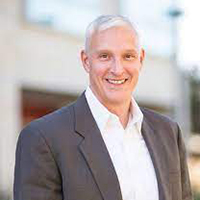
Todd Pawlicki, PhD, FAAPM, FASTRO
Professor & Vice Chair,Radiation Medicine, UC San Diego
Dr. Todd Pawlicki is a Professor and Vice-Chair for Medical Physics. He is also the Director of the Division of Medical Physics overseeing all the clinical and research Medical Physicists in the Department.
An internationally-recognized academic Medical Physicist with a focus on quality and safety. He previously served on the Board of Directors of the American Society of Radiation Oncology (ASTRO) and is a former Secretary of the American Association of Physicists in Medicine (AAPM). He has served on numerous ASTRO and AAPM committees and working groups (many as Chair), including the ASTRO Clinical Affairs and Quality Committee, the ASTRO Multi-disciplinary Quality Assurance Sub-Committee, AAPM Task Group 218, Task Group 288, Task Group 302, Task Group 332 and is the Vice-Chair of the Medical Physics 3.0 Initiative. In recognition of his long-time contributions, he has been named a Fellow by both organizations (FAAPM 2012 and FASTRO 2016).
An author of over 120 journal articles, reviews and book chapters, Dr. Pawlicki is the Editor of the textbook Quality and Safety in Radiotherapy, the first international textbook focused on quality/safety in the field of radiation oncology, and has edited multiple other textbooks. He is a previous member of multiple journal Editorial Boards and the past Executive Physics Editor for the journal Practical Radiation Oncology. He is the Co-Director of the Systems Engineering & Design (SED) Program within the Center for Precision Radiation Medicine (CPRM) which is focused on re-designing Radiation Oncology, particularly QA approaches and the role of the Medical Physicist.
He serves on numerous Department Committees including the Faculty Merits & Promotions Committee, the Committee on Committees, the Executive Finance Committee, the Faculty Climate & Development Committee, and the RMAS Council, an Advisory Board to the Chair comprised of senior Department Leaders. He has served or is serving on multiple committees within UC San Diego including Chair Search committees, Radiation Safety Committee, the UC San Diego School of Medicine Core Curriculum Committee, and the University Committee on Academic Personnel. He is also involved in resident education and is the Director of the Leadership & Professionalism Course for the Medical and Physics Residents.
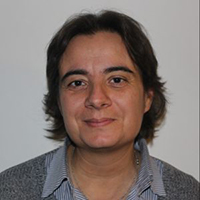
Tiziana Rancati, MSc, PhD
Prostate Cancer Program, Fondazione IRCCS Istituto Nazionale dei TumoriDr. Tiziana Rancati is a medical physics researcher at the Prostate Cancer Program (Scientific Director’s Office, Fondazione IRCCS Istituto Nazionale dei Tumori, Milan).
Main activities include development of NTCP models for the description of radioinduced toxicity with engagement in studies on the possible genetic component of toxicity, involvement in the development and validation of clinical models for the prediction of toxicity in radiation therapy, participation in the design and analysis of clinical trials devoted to assessment and modelling of radioinduced toxicity, involvement in the research programs of active surveillance protocols and in the research programs of Quality of Life for cancer patients.
Current interests are introduction of information on microbiota into NTCP models, radiobiological model of treatment response through mouse models, and developing machine learning and development of mechanistic models of the radioinduced damage to microcirculation.
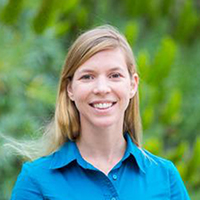
Xenia Ray, PhD
Assistant Professor, Radiation Medicine & Applied Sciences, UC San DiegoDr. Xenia Ray is an Assistant Professor and a member of the La Jolla Physics Team. A research-focused Physicist, she is the Associate Director of Adaptive Radiotherapy in the Center for Quality, Innovation, Value and Efficiency in Radiotherapy (QUIVER).
Her research interests are focused on using the volumes of data generated by cancer centers to inform important clinical decisions surrounding patient care. Past projects included using radiomics features extracted from computed tomography images to predict non-small cell lung cancer outcomes, developing metrics to evaluate the performance of publicly available knowledge-based treatment models, and investigating the sensitivity of transit images to detect changes during treatment. She is currently developing an automated batch-processing framework to investigate the dosimetric gains possible with daily adaptive planning. This framework will provide quantitative data for when and how plans should be adapted using routinely acquired CBCT imaging, automated segmentation, and knowledge-based planning.
Dr. Ray is also an active clinical medical physicist in both external beam radiotherapy and brachytherapy. She is the Gastrointestinal (GI) Tumor Technology Section Chief and has an expanding role in resident education as a UCSD lecturer and rotation mentor.

Ida Deichaite, PhD
Assistant Adjunct Professor, Radiation Medicine & Applied Sciences, Dir. Translational Programs, Moores Cancer Center, UC San DiegoDr. Ida Deichaite oversees the translational aspects of oncology at UC San Diego Moores Cancer Center, turning innovation into commercial applications. Her successful partnering with pharma includes overseeing strategy and execution of translational alliances between academia and industry.
Dr. Deichaite is an Assistant Adjunct Professor in the Department of Radiation Medicine and Applied Sciences. Her research is focused on radiogenomics for personalizing radiation therapy to improve outcomes.
She is the Section Editor of Science Policy and Industry/Academia Interface of the Journal of Translational Medicine. Dr. Deichaite is widely published in numerous scientific journals. Dr. Deichaite received her Ph.D. from Princeton University, Master’s degree from the Weizmann Institute, and BA from Hebrew University.